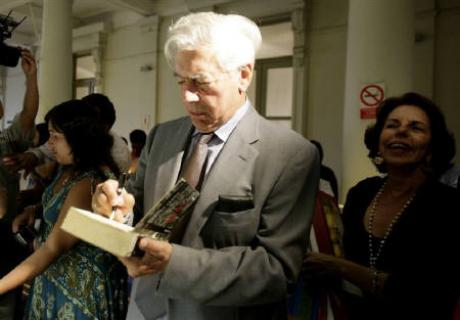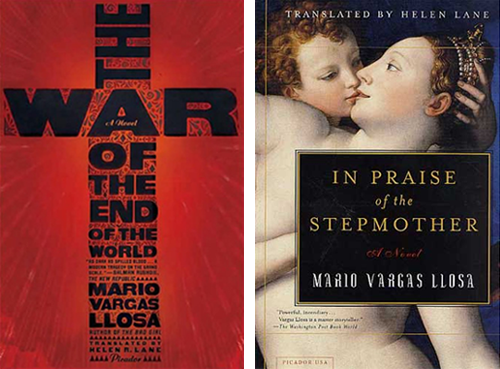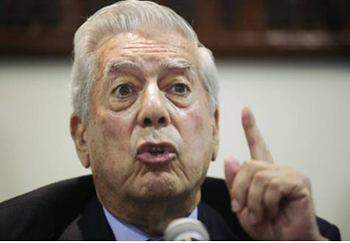Apr 14, 2025
Apr 14, 2025
 The great Peruvian writer Mario Vargas Llosa (pronounced as (MAH'-ree-oh VAHR'-gahs YOH'-suh) has finally won the 2010 Nobel prize for Literature. The Swedish Academy which manages the Nobel Prize stated that the award goes to him for "his cartography of structures of power and his trenchant images of the individual's resistance, revolt and defeat." For many years, he had been sidelined by the academy for political reasons. He is a worthy successor to Gabriel Garcia Marquez, the Columbian author and the last novelist to win a Nobel Prize from Latin America (famous for masterpiece, “One Hundred of Solitude”. He won Nobel Prize in 1981). My joy doubles as I am a huge fan of Latin American Literature. The academy’s perennial neglect of great Latin American writers like Jorge Luis Borges, Julio Cortazar and Juan Rulfo-all who died without winning the Nobel- is notorious. I pray that one day the living Mexican writer Carlos Fuentes too wins this prize.
The great Peruvian writer Mario Vargas Llosa (pronounced as (MAH'-ree-oh VAHR'-gahs YOH'-suh) has finally won the 2010 Nobel prize for Literature. The Swedish Academy which manages the Nobel Prize stated that the award goes to him for "his cartography of structures of power and his trenchant images of the individual's resistance, revolt and defeat." For many years, he had been sidelined by the academy for political reasons. He is a worthy successor to Gabriel Garcia Marquez, the Columbian author and the last novelist to win a Nobel Prize from Latin America (famous for masterpiece, “One Hundred of Solitude”. He won Nobel Prize in 1981). My joy doubles as I am a huge fan of Latin American Literature. The academy’s perennial neglect of great Latin American writers like Jorge Luis Borges, Julio Cortazar and Juan Rulfo-all who died without winning the Nobel- is notorious. I pray that one day the living Mexican writer Carlos Fuentes too wins this prize.
Non-literary readers may still recall Mario Vargas as the Peruvian presidential candidate who contested against Albert Fujimoro in 1990 and lost it. His Cuban friend and writer Guillermo Cabrera Infante had at that time characterized his defeat as a gain for literature. As Infante said, “Literature is eternity, politics mere history," Throughout his storied career, Peruvian writer Mario Vargas Llosa has been regarded as one of the most influential writers in South America.. Mario Vargas Llosa is very popular among literary readers for his astonishingly great works like “Green House”, “Aunt Julia and the Script writer" and "War of the end of the World."
“Aunt Julia and the Scriptwriter” is a novel that walks on the thin line of fact and fiction. It is one novel that I discuss every time I encounter a fan of his works. "Aunt Julia" is perfection in craft and thematic integrity. Mario, a 19-year old Law-student working in a radio station, falls in love with his aunt-in-law, Julia Urquidi. She thinks Mario is a child and calls him 'Varguitas' but soon he proves to her he's a young man already, with great ambitions of becoming a novelist in Paris. They end up in love, and issues arise when relatives become aware of this. They flee to an unknown town intending to be married. Meanwhile, Mario finds a friend in Pedro Camacho, a soap opera radio writer who, after achieving great success, has begun to lose control over his characters (they die in one episode to reappear the next) and runs of the risk of being fired since the audience is getting confused. The boiling imagination of Camacho's scripts and the riotous life of Varguitas is interwoven in the novel. This is the most fascinating aspect of this novel. Varguitas confronts his family claiming that he will provide a good life to Julia. She encourages him to pursue his dream of going to Paris and the script w
writer Camacho loses his mind and is sent to a mental hospital.
The starting of passage in his chaotic epic novel "War of the end of the World" is one of the great literary passages in Latin American literature. The emergence of the hero like Christ at the beginning of this novel is an example of riveting characterization. The novel presents a detailed representation of Latin American history and epic storytelling. It is a fictionalized history of Canudos, a community in the dry interior of Brazil that was utterly wiped out by the Brazilian army in 1897. Llosa has a singular tenderness for this novel, asserting it in many interviews as his best book, and I cannot agree more on this.

“In praise of stepmother” is another very short novel that I thoroughly enjoyed reading, especially for the intellectually and erotically stimulating content. I would say it tastes exactly like ‘Bloody Mary”. Wickedly witty and fun, this is a strange and beautiful little gem and a truly masterful and original piece of erotic storytelling. The book is primarily around 3 characters - Don Rigoberto, his son Alfonso and second wife Lucrecia. I would recommend this to a casual reader who wants to taste his works. Another novel that hugely explores his arsenal of humor is “Captain Pantoja and the Special Service”.
Most of his novels combine scathing political commentary with complex literary style that engrosses the reader. His first novel, “The Time of the Hero” is a thinly veiled account of the corruption Vargas Llosa himself experienced at a Military Academy. “Clubs” explores the brutal rite of passage from adolescence to adulthood by telling the story of a boy emasculated by a dog. Another noted work, “Story Teller”, weaves together the lives of a Peruvian man who goes to live with an ancient tribe in the Amazon and a college friend who is haunted by the thought of the tribes. It alternates between sections of the writer`s life and the stories told deep in the rainforest. “The Real Life of Alejandro Mayta” is about a failed revolution of the 1960's that was perpetrated by a high school classmate of a writer in contemporary Peru. “Death in the Andes” is structurally a mystery story in which two soldiers assigned to a barren outpost investigate the disappearance of three men in the remote mining communities of the Andes.
Lastly, I would cite one non-fiction book, “Letters to a Young Novelist” (modeled on Rilke’s “Letters to a Young Poet”) which has been hailed as the cheapest resource on how to write a novel. He has condensed his lifetime of writing, reading, and thought into an essential manual for aspiring writers. I would gladly recommend this to all budding writers. It is written in a lucid style with plethora of illustrations drawn from many literary works of high repute.
Mario Vargas Llosa is a highly committed litterateur. In his Paris Review Interview (that appears in the book “Latin American Writers at Work”) he says, “You could say that to write is necessary and to live is unnecessary. Literature has been important to me ever since I was a child. Literature is more than a modus Vivendi: I believe the choice a writer makes to give himself entirely to his work, to put everything at the service of literature instead of subsuming it to other considerations is absolutely critical. Some people think of it as a kind of complementary or decorative activity in a life devoted to other things or even as a way of acquiring prestige and power. In those cases, there is a block, it’s literature avenging itself, not allowing you to write with any freedom, audacity or originality. That’s why I think it’s important to make an absolutely total commitment to literature”.
At another place he says, “My greatest quality is my perseverance. I am capable of working extremely hard and getting more out of myself than I thought was possible. My greatest fault, I think, is my lack of confidence, which torments me enormously. It takes me three or four years to write a novel – and I spend a good part of that time doubting myself. I write because I am unhappy. I write because it is a way of fighting unhappiness”. While this can be rated as the mere modesty of this great writer, Nobel should surely skyrocket his self-confidence.
 Reading Vargas Llosa is a treasured experience in life that no fiction fans should ever miss. If any of you think that it is not worth it, I can cite a passage from “Human Province” by Elias Canetti: ‘While the hemlock was being prepared, Socrates was learning a melody on the flute. “What use wlll that do to you?”, he was asked. “At least I will learn that melody before I die”, said Socrates'.
Reading Vargas Llosa is a treasured experience in life that no fiction fans should ever miss. If any of you think that it is not worth it, I can cite a passage from “Human Province” by Elias Canetti: ‘While the hemlock was being prepared, Socrates was learning a melody on the flute. “What use wlll that do to you?”, he was asked. “At least I will learn that melody before I die”, said Socrates'.
By bestowing the Nobel Prize on Vargas Llosa, the academy has truly recognized the grandeur and legacy of legitimate literature as the finest expression of humanity.
10-Jul-2010
More by : P. G. R. Nair

|
Thanks for the intro. I haven't read him yet. But you have aroused in me the thirst to read his work. I too am a fan of Latin American literature. |